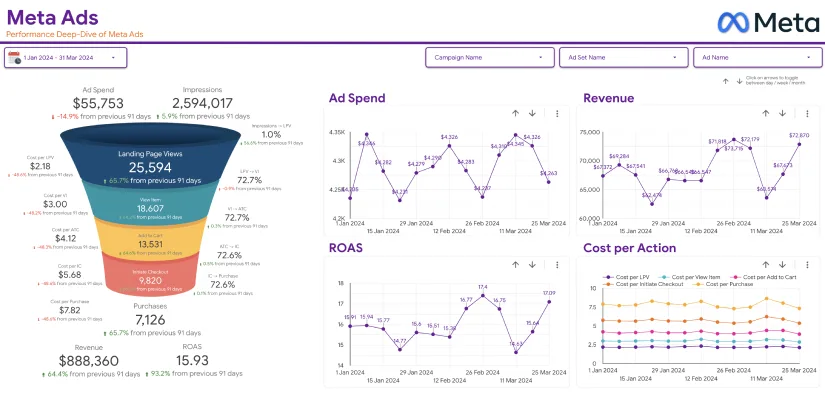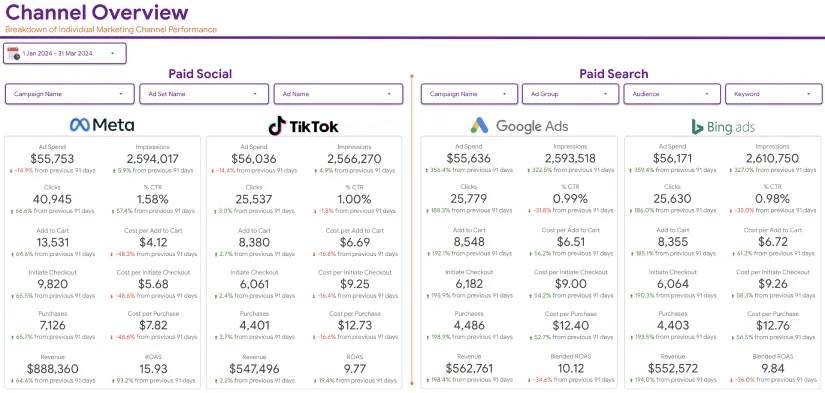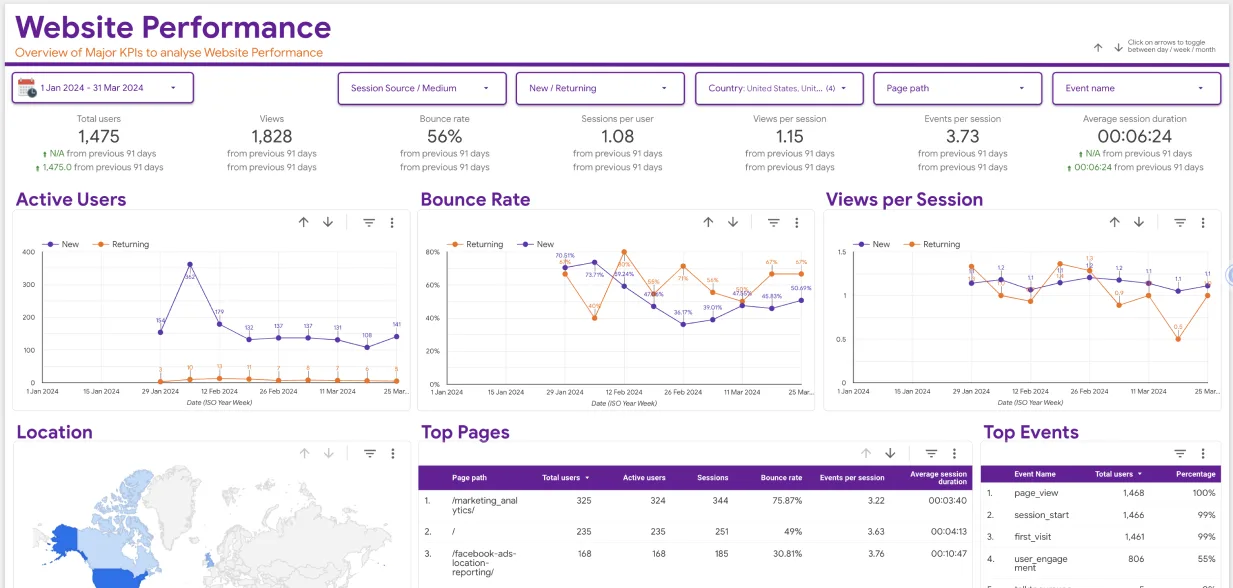In today’s digital landscape, data is king, and understanding your audience is crucial for successful marketing campaigns. One of the most powerful tools available for gaining insights into your website’s performance is Google Analytics. From tracking website traffic to analyzing user behavior, Google Analytics provides a wealth of information that can inform and improve your digital marketing strategies.
Introduction to Google Analytics: What is Google Analytics?
Google Analytics is a free web analytics service offered by Google that tracks and reports website traffic. It provides valuable insights into how users interact with your website, including information about their demographics, behavior, and interests.
Importance of Google Analytics in Digital Marketing
In the competitive world of digital marketing, understanding your audience is key to success. Google Analytics allows marketers to track the effectiveness of their campaigns, identify areas for improvement, and make data-driven decisions to optimize their strategies.
Setting Up Google Analytics
Creating a Google Analytics Account
Getting started with Google Analytics is easy. Simply sign up for an account using your Google credentials and follow the prompts to set up your website.
Installing the Tracking Code on Your Website
After creating your account, you’ll need to install the Google Analytics tracking code on your website. This code allows Google to collect data about your site visitors and their interactions.
Understanding Google Analytics Interface
Overview of the Dashboard
Upon logging in to your Google Analytics account, you’ll be greeted with an intuitive dashboard that provides an overview of your website’s performance at a glance.
Navigating Through Reports and Sections
Google Analytics offers a variety of reports and sections, each providing valuable insights into different aspects of your website’s performance. Familiarizing yourself with these reports is essential for making the most of the platform.
Key Metrics and Reports
Traffic Sources
Understanding where your website traffic is coming from is crucial for targeting your marketing efforts effectively. Google Analytics provides detailed reports on traffic sources, including organic search, direct traffic, and referrals.
Audience Demographics
Knowing your audience demographics allows you to tailor your content and messaging to better resonate with your target market. Google Analytics provides insights into the age, gender, location, and interests of your website visitors.
Behavior Flow
The behavior flow report in Google Analytics visualizes the path that users take through your website, allowing you to identify any bottlenecks or areas where users are dropping off.
Goal Setting and Tracking
Setting Up Goals
Setting up goals in Google Analytics allows you to track specific actions that users take on your website, such as signing up for a newsletter or making a purchase.
Tracking Conversions and ROI
By tracking conversions and ROI (Return on Investment), you can determine the effectiveness of your marketing campaigns and make informed decisions about where to allocate your resources.
Utilizing Acquisition Reports
Analyzing Traffic Sources
The acquisition reports in Google Analytics provide insights into the sources of your website traffic, including organic search, paid search, social media, and referrals.
Evaluating Campaign Performance
By analyzing the performance of your marketing campaigns, you can identify which channels are driving the most traffic and conversions, allowing you to optimize your marketing budget accordingly.
Enhancing User Experience with Behavior Reports
Analyzing Page Views and Bounce Rates
The behavior reports in Google Analytics allow you to track user engagement metrics such as page views, bounce rates, and time spent on site, helping you identify areas for improvement in your website’s user experience.
Identifying Popular Content
By analyzing which pages on your website are the most popular, you can gain insights into what type of content resonates with your audience and tailor your content strategy accordingly.
Measuring Conversion Rates with Conversion Reports
Tracking E-commerce Transactions
If you run an e-commerce website, tracking e-commerce transactions in Google Analytics allows you to monitor sales performance and identify opportunities for growth.
Analyzing Conversion Funnels
By analyzing conversion funnels, you can identify where users are dropping off in the conversion process and take steps to optimize the user journey for increased conversions.
Advanced Features and Customization
Setting Up Custom Reports
Google Analytics offers a range of customization options, allowing you to create custom reports tailored to your specific business goals and KPIs (Key Performance Indicators).
Implementing Event Tracking
Event tracking in Google Analytics allows you to track specific user interactions on your website, such as clicks on buttons or downloads of files, providing valuable insights into user behavior.
Optimizing Marketing Strategies
Using Data to Refine Marketing Campaigns
By analyzing data from Google Analytics, you can identify trends and patterns in user behavior that can inform and refine your marketing strategies for maximum effectiveness.
A/B Testing and Data-Driven Decision Making
A/B testing allows you to compare different versions of a web page or marketing campaign to see which performs better, helping you make data-driven decisions to optimize your marketing efforts.
Mobile Analytics
Importance of Mobile Analytics
With an increasing number of users accessing the internet via mobile devices, understanding mobile user behavior is essential for optimizing your website and marketing campaigns for mobile users.
Analyzing Mobile User Behavior
Google Analytics provides insights into how mobile users interact with your website, including information about device types, screen sizes, and mobile-specific traffic sources.
Integrating with Other Platforms
Connecting Google Analytics with AdWords
By connecting Google Analytics with Google AdWords, you can gain deeper insights into the performance of your advertising campaigns and make data-driven decisions to optimize your ad spend.
Integrating with Social Media Platforms
Integrating Google Analytics with social media platforms allows you to track the effectiveness of your social media marketing efforts and measure the ROI of your social media campaigns.
Data Privacy and Compliance
GDPR and Data Protection
With increasing concerns about data privacy and security, it’s essential to ensure that your use of Google Analytics complies with regulations such as the GDPR (General Data Protection Regulation).
Ensuring Compliance with Regulations
By following best practices for data privacy and compliance, you can build trust with your website visitors and ensure that your use of Google Analytics is both ethical and legal.
Continuous Monitoring and Analysis
Regularly Reviewing Reports
Digital marketing is an ever-evolving field, and it’s essential to regularly review your Google Analytics reports to stay informed about changes in user behavior and market trends.
Adjusting Strategies Based on Insights
By analyzing the data from Google Analytics and making data-driven decisions, you can continuously optimize your marketing strategies for better results and ROI.
FAQs
In conclusion, leveraging Google Analytics for digital marketing insights is essential for success in today’s competitive landscape. By understanding your audience, tracking key metrics, and making data-driven decisions, you can optimize your marketing efforts for maximum effectiveness and ROI.
1. How often should I check my Google Analytics data?
It’s a good practice to check your Google Analytics data regularly, ideally at least once a week, to stay informed about changes in user behavior and website performance.
2. Can I use Google Analytics for my e-commerce website?
Yes, Google Analytics offers robust e-commerce tracking features that allow you to monitor sales performance, track conversion rates, and analyze customer behavior on your e-commerce website.
3. Is Google Analytics free to use?
Yes, Google Analytics is free to use for websites with up to 500,000 sessions per month. For larger websites, Google offers a premium version called Google Analytics 360.
4. How can I learn more about using Google Analytics effectively?
Google offers a range of resources, including online courses, documentation, and community forums, to help users learn how to use Google Analytics effectively.
5. Can I share my Google Analytics data with others?
Yes, Google Analytics allows you to share access to your data with other users by granting them permissions within your Google Analytics account. This can be useful for collaborating with team members or sharing insights with clients or stakeholders.





